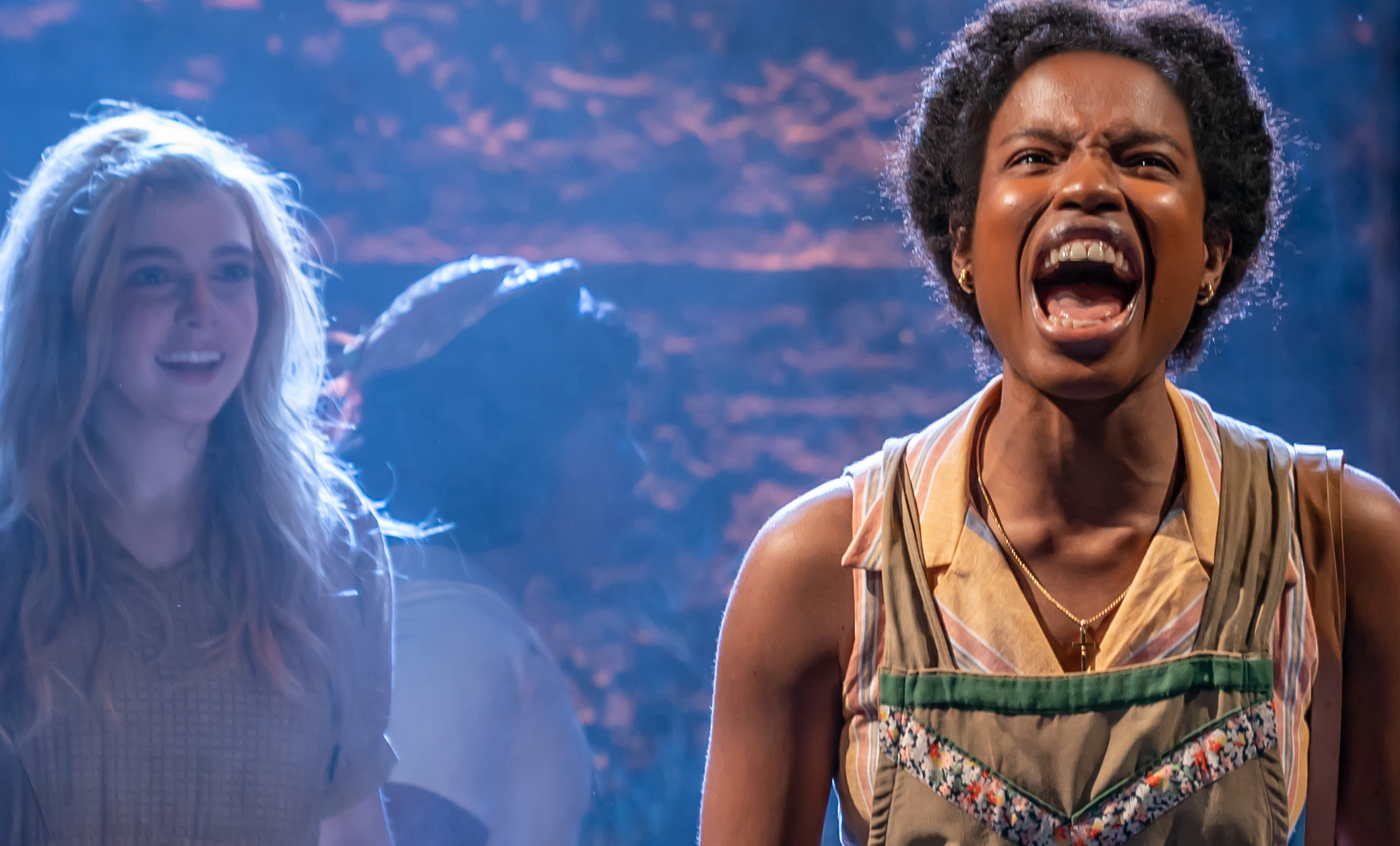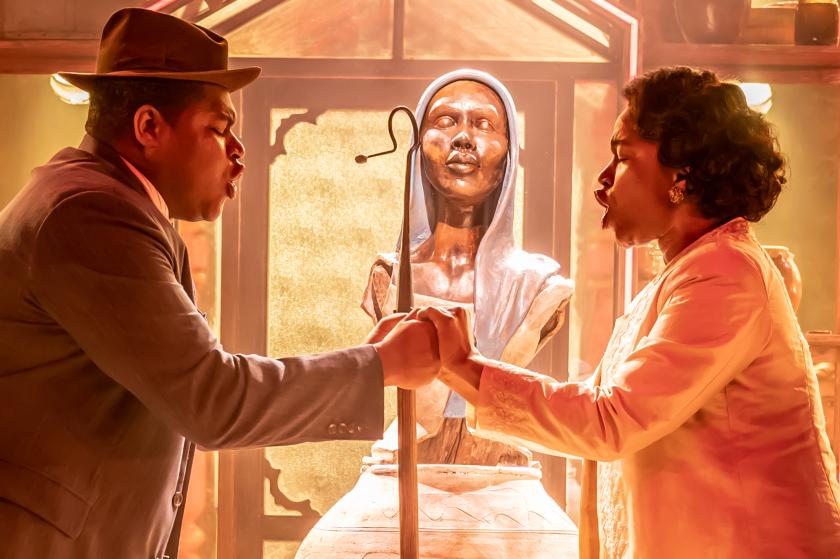The cast of The Secret Life of Bees first parade onto the Almeida stage hefting big glass storage jars full of a golden substance: honey. The jars glow as if they are beacons, lights that guide. Which they turn out to be.
Most of the people in this parade are the Black women who tend the bees that produced this honey, creatures with a covetable sense of community, ready to unite against danger to the hive. Along with them are white folk with a different idea of a model community, a white supremacist one where Blacks can’t vote.
It’s 1964, as a timeline running throughout reminds us, provided by radio announcers delivering the violent headlines of the era. President Johnson is preparing to pass the Civil Rights Act, Black voter registration in the South is meeting brutal resistance, Black churches are being burnt down with people inside them, and three civil rights workers are murdered in Mississippi.
This is unusual terrain for a musical, but the award-winning forces behind it – book by two-time Pulitzer-winning playwright Lynn Nottage, lyrics by Susan Birkenhead, music by Duncan Sheik (Spring Awakening) – juggle with its tricky tone mostly with great success. Visible violence is kept to a minimum, though its potential to erupt is never downplayed.
In the opening scene we see a dishevelled 17-year-old white girl, Lily (Eleanor Worthington-Cox), a book-loving only child being brutalised by her father and forced to kneel on hard ground until her knees bleed. Shortly after, when the family’s Black maid, Rosaleen (Abiona Omonua, pictured below with Worthington-Cox), tries to register to vote, she is assaulted by two white men. The two women run away. As Rosaleen pungently says of their town: “Some folks born on the wrong side of right.”
They find their way to a place of relative safety, where Lily’s late mother had once sought shelter: a bright pink shrine to a Black Madonna set up by three sisters who run a thriving honey business: May, June and August. This seems a mite fanciful, but the tone grows sombre when the shocking story of why there is no sister called April is told. The surviving sisters have created a home for themselves; Lily and Rosaleen must find theirs. Do they have the courage to break free of a society that wants them to be silent and invisible?  The sense of foreboding and despair in the piece is balanced by its upbeat moments, as the women show the newcomers their daily routines. August (Rachel John), the de facto matriarch, tells a frightened Lily how to manage the bees: stay calm, don’t agitate them and they will leave you alone. It’s a rubric you sense she wants to apply to the wider white-run world, where its precepts are much less likely to succeed. Lily, though, grows in confidence, and there are beautiful scenes of her inspecting the honey frames, which glow like gems. The bees, August says, have secrets you can tune into if you know how, much as the women who worship the Black Madonna have a shared private language.
The sense of foreboding and despair in the piece is balanced by its upbeat moments, as the women show the newcomers their daily routines. August (Rachel John), the de facto matriarch, tells a frightened Lily how to manage the bees: stay calm, don’t agitate them and they will leave you alone. It’s a rubric you sense she wants to apply to the wider white-run world, where its precepts are much less likely to succeed. Lily, though, grows in confidence, and there are beautiful scenes of her inspecting the honey frames, which glow like gems. The bees, August says, have secrets you can tune into if you know how, much as the women who worship the Black Madonna have a shared private language.
The look of the show is unexpectedly pretty. It's beautifully lit, all yellows and golds for the sun-baked daylight scenes. The women are dressed as if in their Sunday best for church, which in a sense is where they are, praying to their Black Mary. They shimmy and jive to blues-inflected music (great choreography by Shelley Maxwell) in lurex-thread fabrics and boldly coloured shirtwaister dresses, their elaborate hairdos lacquered into submission. Think early Supremes. Only Lily looks drab and dowdy, though her beauty emerges as she befriends Zach (Noah Thomas), a local Black boy who aims to go to law school. They sing themselves into a romance, in one of the more gentle moments. But mostly the songs, belted out as passionately as hymns, speak of intense pain and anger: of being denied an education, a vote, a say in their lives. Only at the shrine do the women have any autonomy.
There is no weak link in the cast, a varied lineup of strong voices, with Worthington-Cox’s silvery soprano weaving through them. When they sing in unison, it's spine-tingling. The best role is sparky Rosaleen, the maid left behind by her mother. Her amazement at discovering there’s a mad Mrs Rochester in the attic when she starts reading Jane Eyre is both funny and moving. Omonua delivers the last lines of a song in the midst of her assault, her voice conveying her distress, as if she is trying not to weep and scream.
Holding his own against this bevy of redoutable women is Neil (Tarrin Callender), the multiply rejected suitor who has been coming to visit once a fortnight to propose to June (Ava Brennan), the only sister who sees danger in Lily’s presence and wants to send her “home”. Callender is the real deal, with a fabulous easy baritone and a dynamic dancing style.
As the story heads to a climax, it becomes a tad predictable, and the last quarter in particular seems to rush towards a finale, leaving unresolved plot strands in its wake. But the strength of the performances carries the piece well over the finish line, and you are left with a hymn to hope. It’s a memorable production of a stirring musical.















Add comment